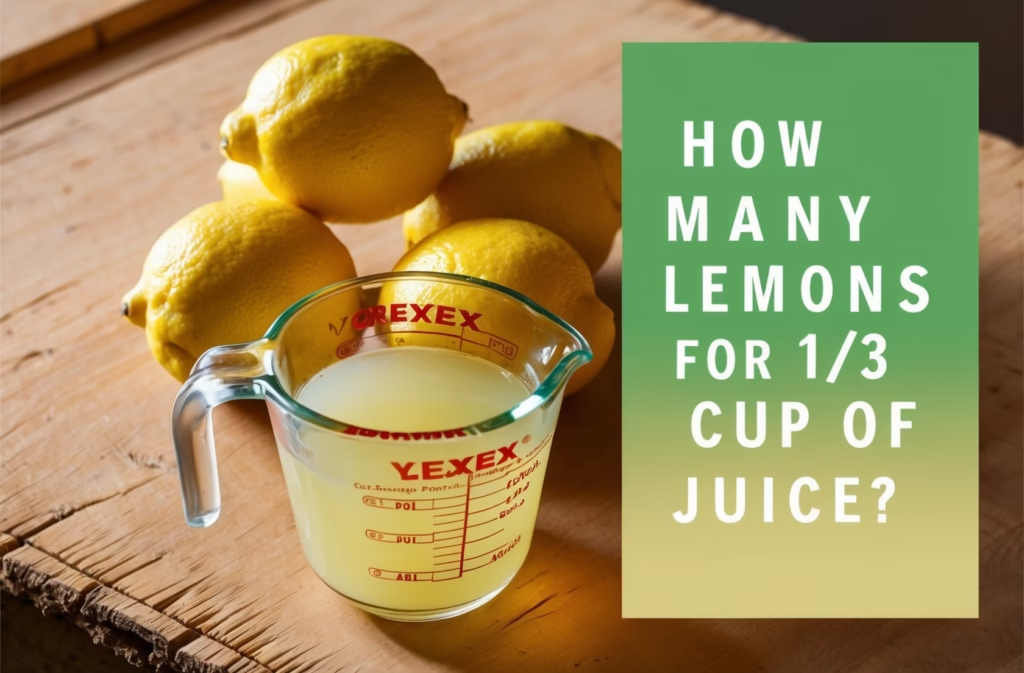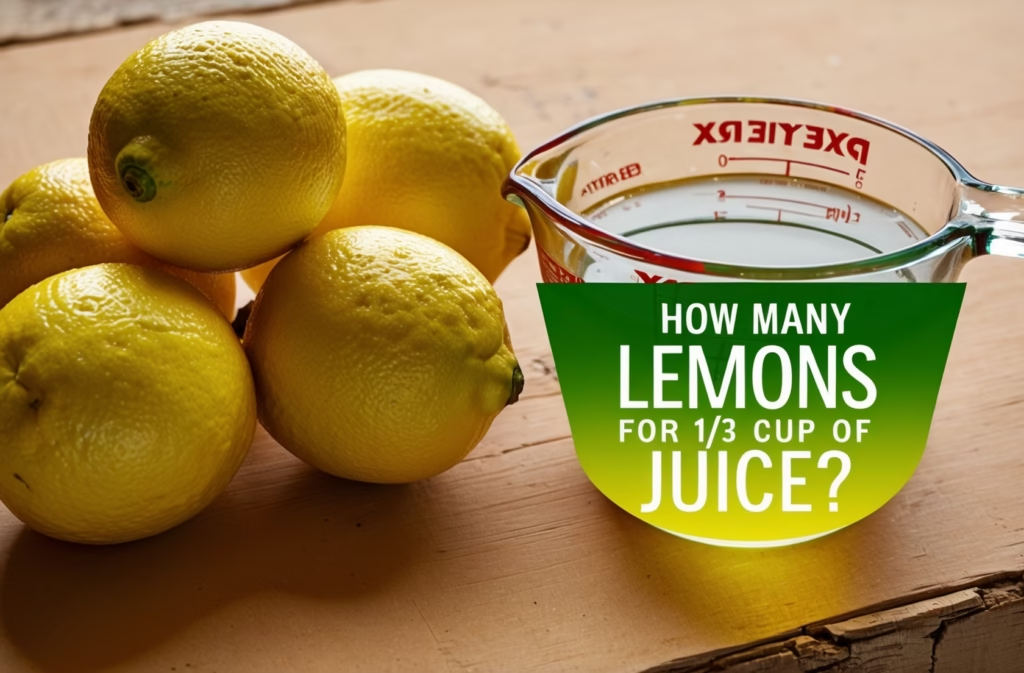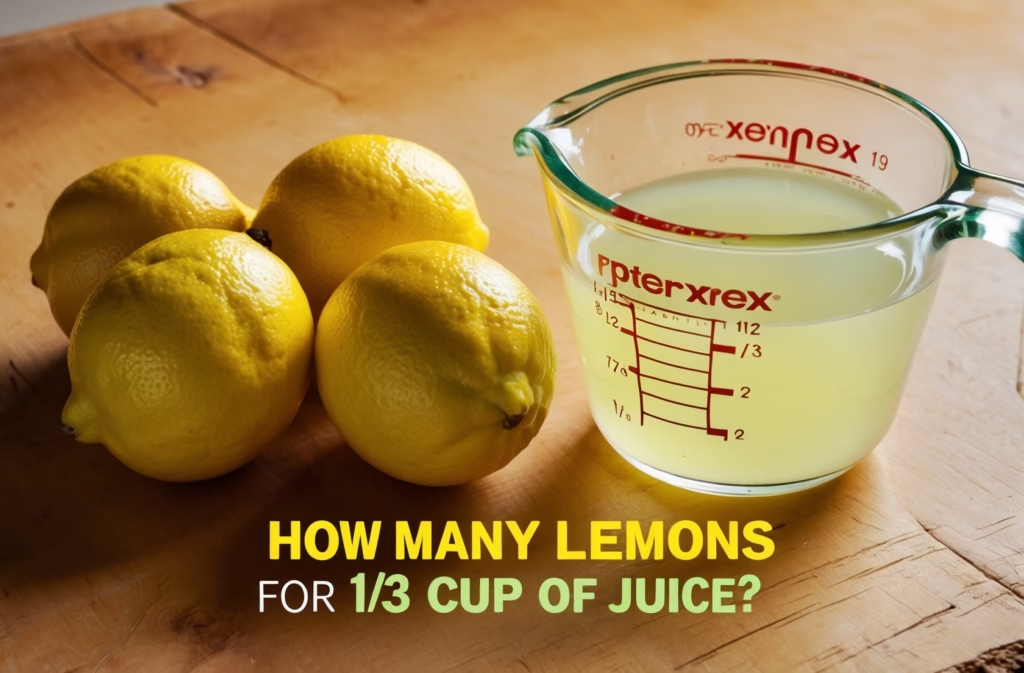How Many Lemons Equal 1-3 Cup Of Juice

Need to know how many lemons equal 1-3 cups of juice? Find the perfect lemons to juice ratio & learn how many cups of lemon juice you get per lemon! This guide provides easy-to-follow calculations and tips for juicing success.
How Many Lemons Equal 1-3 Cups of Juice? Your Ultimate Guide to the Lemons to Juice Ratio
Are you planning a lemon-infused extravaganza? Whether you’re whipping up a batch of refreshing lemonade, creating a zesty lemon curd for a delicious lemon curd cake, or needing that perfect tang for a dairy-free lemon cake, knowing the correct lemons to juice ratio is crucial. This comprehensive guide will delve into the intricacies of extracting lemon juice, helping you accurately determine how many lemons equal 1-3 cups of juice and providing helpful tips for maximizing your yield.
Understanding the Variability: Why the Lemons to Juice Ratio Isn’t Exact
Before we jump into specific numbers, it’s essential to acknowledge the inherent variability in lemon juice yield. Several factors influence how much juice you can extract from a single lemon:
- Lemon Size and Type: Larger lemons naturally contain more juice than smaller ones. The variety of lemon also plays a role; some varieties are simply juicier than others.
- Lemon Ripeness: Ripe lemons generally yield more juice than unripe or overripe ones. Look for lemons that feel heavy for their size and have a bright yellow, even color.
- Juicing Method: Using a hand juicer versus an electric juicer can affect the amount of juice you extract. Electric juicers tend to extract slightly more juice than manual methods.
These variations mean that there’s no single, universally accurate answer to the question, “How many lemons equal 1 cup of juice?” However, we can provide a reasonable estimate to guide you.
How Many Lemons Equal 1-3 Cups of Juice? A Practical Estimation
As a general guideline, you can expect to get approximately ¼ to ½ cup of juice from a single medium-sized lemon. This translates to the following approximate estimations:
- 1 cup of lemon juice: Expect to use 2 to 4 medium-sized lemons.
- 2 cups of lemon juice: Plan on using 4 to 8 medium-sized lemons.
- 3 cups of lemon juice: You’ll likely need 6 to 12 medium-sized lemons.
These are estimations, and you might need more or fewer lemons depending on the factors mentioned earlier. It’s always best to start with a slightly higher number of lemons to ensure you have enough juice for your recipe. You don’t want to be halfway through baking your lemon cake recipe and realize you’re short on juice!
Optimizing Your Lemon Juice Yield: Tips and Tricks
To maximize the amount of juice you get from your lemons, consider these helpful tips:
- Roll the lemons: Before juicing, roll the lemons firmly on a flat surface to help break down the internal membranes and release more juice.
- Microwave the lemons: Microwaving the lemons for about 15-20 seconds can also help increase juice yield. Be careful not to overheat them.
- Use a quality juicer: Investing in a good juicer, whether manual or electric, will help you extract the maximum amount of juice. A citrus press is ideal for maximizing juice extraction.
- Strain the juice: Strain the juice through a fine-mesh sieve to remove any seeds or pulp for a smoother, clearer result in your baked goods like this delightful lemon bundt cake.
The Importance of Accurate Measurement in Baking
When it comes to baking, accuracy is key. Using the correct amount of lemon juice can significantly affect the flavor and texture of your final product. Too little juice and your lemon pound cake might lack that signature tang; too much, and it could throw off the balance of other ingredients. Therefore, carefully measuring your lemon juice using a liquid measuring cup is vital.
Cups of Lemon Juice per Lemon: A Deeper Dive
While the previous estimations offer a good starting point, let’s explore the cups of lemon juice per lemon in more detail. Consider these additional factors:
- Lemon Size: A small lemon might yield only ¼ cup of juice, while a large lemon could give you almost ½ cup. Regularly sized lemons will usually yield about 1/3 cup of juice.
- Juice Extraction Technique: As mentioned before, your juicing method dramatically affects the yield. Some lemons might have stubborn seeds or pulp, therefore needing a bit more effort in the juicing process.
- Seasonality: The juiciness of lemons can vary depending on the season. Lemons harvested during peak season might be juicier.
The best approach is to test a few lemons and measure the juice you extract. This will provide a more precise lemons to juice ratio for your specific lemons. Keep a record of your findings for future reference.
Troubleshooting: What to Do If You Don’t Have Enough Lemon Juice
Let’s say you’ve followed the guidelines, but you still don’t have enough lemon juice. Don’t panic! Here are some options:
- Use Lemon Concentrate: Lemon concentrate can be a convenient alternative, but remember to dilute it according to the package instructions.
- Substitute with Lime Juice: If you’re in a pinch, lime juice can be a suitable substitute, although it will impart a slightly different flavor profile.
- Adjust the Recipe: If a slight reduction in lemon juice won’t significantly affect the final product, you might consider reducing the quantity of lemon juice called for in the recipe.
Always prioritize safety and quality ingredients. If you’re unsure about the reliability of any substitute, err on the side of caution and adjust your recipe accordingly.
Beyond the Basics: Using Lemon Zest and Juice Together
Don’t forget the zest! The zest of a lemon contains essential oils that add intense lemon flavor and aroma to baked goods. When making your lemon treat, consider using both the juice and zest for a more complete lemon experience. The combination is excellent in desserts such as cakes, cookies, and lemon bars. Remember to zest the lemons before juicing, to prevent the oils from being lost in the process.
External Resources for Further Learning
For more detailed information on lemon juice yields and baking techniques, we recommend checking out these reputable sources:
- BBC Good Food’s guide to lemon juice yield (offers additional insights and tips)
- Allrecipes’ guide on how to juice a lemon effectively (provides visual instructions and tips for maximizing yield)
Lemons to Juice Ratio: Final Thoughts
Understanding the lemons to juice ratio is a fundamental skill for any baker or cook working with lemons. While an exact answer to “How many lemons equal 1-3 cups of juice?” is elusive due to variations in lemon size and quality, this guide provides practical estimations and valuable tips to help you achieve the perfect amount of lemon juice for your culinary creations. Remember to always start with a slightly higher number of lemons, and adjust accordingly after testing a few.
Call to Action
Now that you’re equipped with this knowledge, go forth and conquer your lemon-centric recipes! Let us know in the comments below how many lemons you used for your latest baking project and how this guide helped you. Share your delicious lemon creations on social media using #LemonJuiceRatio and tag us! Let’s inspire others with our lemon-filled culinary adventures.

FAQ: How Many Lemons Equal 1-3 Cups of Juice?
Q: How many lemons equal 1 cup of lemon juice?
A: It typically takes 2-3 medium-sized lemons to yield 1 cup of juice. The exact number depends on the lemon’s size and juiciness.Q: How many lemons do I need for 2 cups of lemon juice?
A: You’ll likely need 4-6 medium lemons to get approximately 2 cups of juice, depending on the Lemons to Juice Ratio.Q: What’s the average Cups of Lemon Juice per Lemon?
A: A single medium lemon yields about 1/3 to 1/2 cup of juice. This can vary significantly.
Q: I need 3 cups of lemon juice, how many lemons should I buy?
A: For 3 cups of lemon juice, plan to buy 6-9 lemons to account for variations in juice yield.Q: Is there a precise Lemons to Juice Ratio?
A: There isn’t a precise ratio, as lemon juiciness varies. The 2-3 lemons per cup is a good estimate.Q: What size lemons are best for maximizing juice?
A: Heavier lemons are generally juicier. Look for lemons that feel firm and heavy for their size.
Q: How can I get the most juice out of my lemons?
A: Roll the lemons firmly on a countertop before juicing to help break down the pulp and increase juice yield.Q: Can I use a lemon juicer to improve the How Many Lemons Equal 1-3 Cup Of Juice calculation?
A: Yes, a citrus juicer significantly improves juice extraction, making it easier to estimate the Lemons to Juice Ratio accurately.Q: Does the type of lemon affect the amount of juice?
A: Different lemon varieties have slightly varying juice contents, but the difference isn’t usually drastic enough to significantly alter the How Many Lemons Equal 1-3 Cup Of Juice calculation.
- Q: What should I do if I don’t have enough lemon juice?
A: You can add a little water to dilute the juice, but keep in mind this will impact the flavor. Alternatively, use bottled lemon juice.

How Many Lemons Equal 1-3 Cups of Juice? Your Ultimate Guide to Lemons to Juice Ratio
As a chef with years of experience, I often get asked the question: “How many lemons equal 1-3 cups of juice?” It’s a crucial question for anyone baking a lemon curd cake, whipping up a refreshing lemonade, or creating other lemon-centric delights. The answer, unfortunately, isn’t a simple number. The amount of juice you get from a lemon depends on several factors, including the lemon’s size, ripeness, and variety. This comprehensive guide will delve into the lemons to juice ratio, helping you accurately estimate the number of lemons needed for your recipes, and explore the nutritional benefits of using fresh lemon juice.
Understanding the Lemons to Juice Ratio
The common misconception is that one lemon always yields a consistent amount of juice. This is far from the truth. A small lemon might only yield 1-2 tablespoons of juice, while a large, ripe lemon can provide up to 1/4 cup. Therefore, accurately calculating the number of lemons needed for 1-3 cups of juice requires a bit of experimentation and understanding. We’ll explore this further, providing practical tips and techniques to help you master the art of juicing lemons.
Cups of Lemon Juice per Lemon: The Variability
The average lemon yields roughly 2-4 tablespoons of juice. To make this easier, let’s convert tablespoons to cups: There are 16 tablespoons in one cup. This means you might get between 1/8th and 1/4th of a cup of juice from a single lemon. Based on this, you can start making estimations. For 1 cup of juice, you’ll likely need between 4 and 8 lemons. For 2 cups, you would need 8-16 lemons, and for 3 cups, approximately 12 to 24 lemons. However, these are just estimates.
To obtain a more precise calculation, you should initially juice a few lemons and measure the yield. This will give you a baseline for your particular lemons. Remember that lemon size and ripeness greatly influence the juice content. Overripe lemons can be juicier than underripe ones, but they may also have a slightly bitter taste. Experimenting with a few lemons is crucial to get the hang of your lemons to juice ratio.
How Many Lemons Equal 1-3 Cups of Juice? A Practical Approach
Let’s break down how to estimate the number of lemons you’ll need for 1, 2, and 3 cups of lemon juice:
Estimating for 1 Cup of Lemon Juice
Aim for 6-8 medium-sized lemons. This will provide you with a cushion, ensuring you have enough juice for your recipe. If your recipe uses a significant amount of lemon juice, you can measure the juice from a few lemons before committing to juicing all of them. This allows for adjustments based on the actual yield.
Estimating for 2 Cups of Lemon Juice
For two cups, double the amount from the previous step, using 12 to 16 lemons. Again, start with a smaller batch and measure your yield to ensure accuracy. This minimizes waste and guarantees success in your baking endeavor, whether it’s a dairy-free lemon cake or a classic lemon cake recipe.
Estimating for 3 Cups of Lemon Juice
With three cups of lemon juice, use 18 to 24 lemons. The variability in lemon size and juiciness reiterates the importance of starting with a smaller batch to measure the yield and adjust as needed. You can always juice more lemons, but you can’t un-juice them.
Tips for Maximizing Lemon Juice Yield
To get the most juice out of your lemons, follow these tips:
- Roll the lemons: Before juicing, roll the lemons firmly on a countertop to soften them and release more juice.
- Use a citrus juicer: A manual or electric citrus juicer will significantly increase your yield compared to squeezing by hand.
- Microwave the lemons: Microwaving lemons for 15-20 seconds can help soften them and increase juice yield. However, this depends on the wattage of your microwave so adjust accordingly, avoiding burning the lemons.
- Use a fork: If you don’t have a juicer, you can roll the lemon over the counter then pierce it with a fork before squeezing it. This helps break down the pulp and release more juice.
Recipe Application: A Delicious Lemon Bundt Cake
Once you have your freshly squeezed lemon juice, the possibilities are endless. Let’s consider a classic Lemon Bundt Cake with Cake Mix. This recipe might call for 1/2 cup of lemon juice. Based on our calculations, you might use 3-4 lemons for this recipe, but it’s always good to measure the juice to be sure.
Another option is a decadent Lemon Pound Cake that might need even more lemon juice, making precise measuring even more important.
Nutritional Information of Fresh Lemon Juice (per 1/4 cup serving):
Note: Nutritional information will vary based on lemon size and variety. The following is an approximation.
| Nutrient | Amount per Serving | % Daily Value (2,000 calorie diet) |
|---|---|---|
| Calories | 12 | <1% |
| Protein | 0g | 0% |
| Total Fat | 0g | 0% |
| Saturated Fat | 0g | 0% |
| Unsaturated Fat | 0g | 0% |
| Trans Fat | 0g | 0% |
| Total Carbohydrate | 3g | 1% |
| Dietary Fiber | 0g | 0% |
| Sugars | 2g | – |
| Vitamin C | 15mg | 17% |
| Potassium | 30mg | <1% |
| Calcium | 5mg | <1% |
| Iron | 0.3mg | 2% |
For a more detailed nutritional breakdown of lemon juice, you can consult reliable sources such as the USDA FoodData Central.
Another reliable source of information on the nutritional value of lemon juice can be found on the website of WebMD.
Summary of Nutritional Features
Fresh lemon juice is a low-calorie, nutrient-rich addition to your diet. It’s an excellent source of Vitamin C, an antioxidant that supports the immune system. While relatively low in other vitamins and minerals, the potent flavor and versatility of lemon juice make it a valuable component of many dishes and drinks.
Call to Action
Now that you’re equipped with the knowledge to master the lemons to juice ratio, it’s time to put your newfound skills to the test! Try one of our delicious lemon recipes. Let us know in the comments below how many lemons you used for your creation and how it turned out! Don’t forget to share your culinary triumphs on social media using #LemonJuiceRatio and #HomemadeLemonGoodness!

Determining the exact number of lemons needed for a cup of juice is tricky, as lemon size and juiciness vary considerably. Generally, you can expect to get about 1/4 to 1/3 cup of juice from a single medium-sized lemon. Therefore, to achieve 1 cup of juice, you might need anywhere from 3 to 4 lemons. For 2 cups, aim for 6 to 8 lemons, and for 3 cups, plan on using 9 to 12 lemons. Remember to consider the recipe you’re making; for example, a rich lemon curd like this delicious lemon curd cake might demand more lemons for a deeper flavor.
Always wash your lemons thoroughly before juicing. Consider using a citrus juicer for optimal yield. If you’re making a baked good, such as a dairy-free lemon cake, be sure to adjust the amount of sugar accordingly, as the acidity of lemon juice can impact the sweetness.
Excessive lemon juice consumption can lead to tooth enamel erosion and upset stomach. Moderation is key. If you’re frequently incorporating lemon juice into your diet, perhaps in a delightful lemon cake recipe, consider balancing it with other foods.
When making larger quantities of lemon juice, such as for a lemon bundt cake or a tangy lemon pound cake, it’s helpful to juice the lemons in batches to avoid overwhelming your juicer. Store leftover juice in an airtight container in the refrigerator for up to 3 days. Remember to account for potential variations in lemon size.